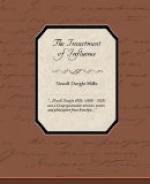The law of sacrifice is also the law of progress and civilization. When history exhibits as dead the nations that have been pleasure-seekers it declares that the state that saveth its life shall lose it. In our own land the bankruptcy and gloom that have for years overshadowed the South speak eloquently of a national gain that is a loss. One hundred years ago the North freed its slaves. Later, when the constitution was adopted, many statesmen believed that slavery was losing its hold in the South. Jefferson said: “When I think that God is just I tremble for my country.” In that hour the statesman prophesied that slavery would soon melt away like the vanishing snow of April. But when Whitney invented his gin and the raising of cotton became very lucrative slavery took on new life. It was Lord Brougham who first said that when slavery brought in 100 percent, while it was seen to be immoral, not all the navies of the world could stop it. Later, when it brought in 300 percent, it became a peculiar institution, patterned after the system of the patriarchs. But when it brought in 300 percent master and slave became a Christian relation, and slavery was baptized with quotations from the Old Testament.
But avarice could not forever blind men’s eyes to scenes of sorrow, nor stop their ears to sounds of woe. When the horrors of the slave-market and the infamies of the cotton-field filled all the land with shame reformers arose, declaring that the attempt to compress and confine liberty would end in explosion. In that hour Northern men made tentative overtures looking to the purchase of all slaves. But slavery, Delilah-like, made the southern leaders drunk with the cup of sorcery. They scorned the proposition. In the light of subsequent events we see that in saving her institution the South lost it, and with it her wealth, while in losing her slaves the North gained her wealth. Under free labor the North doubled its population, its manufactories, its riches and waxed mighty. Under slave-labor the South dwindled in wealth and became only the empty shell of a state. The spark fired at Fort Sumter kindled a conflagration that swept through the sunny South like a devastating fire and revealed its inner poverty. When four years had passed by the farmhouses and factories were ruins, the village was a heap, the town a desolation. Graveyards were as populous as cities, each village had its company of cripples, the cry of the orphan and the widow filled all the land.
When Charles Darwin returned from his voyage around the world, he sent a generous contribution to the London Missionary Society. The great scientist had discovered that in lessening her wealth through missions England had saved her treasure through commerce. Traveling in foreign lands, Darwin noticed that the Christian teachers in schools that now touch 3,000,000 of young men and women in India, were really commercial agents for England’s trade. In awakening




